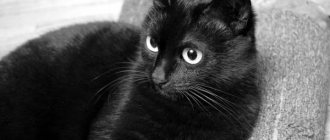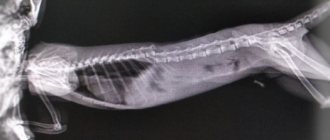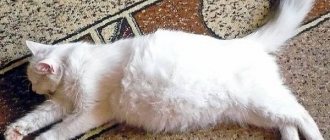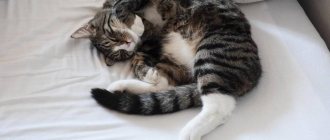People who breed various breeds of cats and sell them further must know all the intricacies when mating cats. Firstly, if the cat does not like the cat, then she may not let him near her. Secondly, the cat does not let the cat near because of health problems. Besides these two reasons, there are many more. The reasons may be in an environment that the cat does not always like. And also in a state of health that needs to be monitored by visiting a doctor in a timely manner. The article will describe in detail the process of planning and achieving a successful result for breeding cats.
Psychological reasons
The cat expresses the entire range of its emotions exclusively through body language, periodically supplementing it with several vocal variations available to it. There are few of them, but with their help the animal manages to convey to humans a huge number of experiences that need correct interpretation.
Predator instinct
It is embedded in every, even the most affectionate little cat, in whose veins flows the blood of distant forest ancestors . If you remind your cat of her hunting reflexes every day, don’t be surprised that over time she will turn into an angry, growling fury.
Important! You should not ask your cat to track the movements of your arm/leg under the blanket: she will get used to attacking without a reason, not realizing that it was a game.
You have awakened a predator in your pet if it:
- jumps on your legs from ambush;
- does not respond to your shout, increasing the pressure;
- bites, hisses and scratches.
Correcting this behavior will be very difficult.
Social aggression
It occurs if a person annoys with excessive caresses. Any cat behaves quite coolly until it wants the owner’s tenderness. She will come up to attract attention, begin to rub against your legs, caress, prop up her back or ask to be held.
But tenderness (according to the cat) must be dosed - as soon as you overdo it with caresses, he will turn from an angel into a devil. At this moment, he is able to bite his hand, hiss and rattle his tail in displeasure, showing that the limit of his patience has been exhausted.
Frustration
This feline condition is akin to a human one and occurs when the pet’s desires do not coincide with its capabilities.
This is interesting! Zoologists have suggested that frustration is characteristic of kittens weaned early from their mother's breast. These animals do not know how to get food on their own and are constantly waiting for handouts, and when they don’t wait, they become aggressive.
Feline frustration is recognized by the following actions:
- the pet hisses at the owner whom he trusts;
- growls, assuming that he did not get a treat;
- screams loudly and rushes about the threshold.
The cat becomes frustrated if the owner is slow to feed, is in no hurry to open the front door, or moves away somewhat from the pet.
Redirected aggression
A similar state can be experienced by cats that are frightened/angry by something in the presence of a particular person.
This is interesting! It is not surprising that he causes unmotivated cat aggression by his very appearance. The animal is isolated and allowed to recover.
Thanks to excellent associative memory, a witness to an unpleasant incident turns into a source of negative memories for the cat.
Fear
A cat growls and hisses if it is fueled by fear due to insufficient socialization or, much worse, harassment and beatings (experienced from an early age).
If the growl is caused by fear, the markers of the latter will be:
- attacking people in the presence of a real/imaginary stimulus;
- growling, supplemented by paw swings;
- increased hissing/growling when the cat is cornered;
- clear warning postures;
- final accentuated licking of fur.
A cat whose fears originated in childhood needs increased attention and patience . She is not punished, but gently re-educated.
Resentment
This emotion is sometimes associated with fear, but often works autonomously. If a cat growls and hisses when it sees its owner, remember what caused the cat’s recent offense. The animal will ignore the offender or show its dissatisfaction openly, based on the severity of the offense. Talk to your pet so that the confrontation does not drag on, and be sure to sweeten your apology with a treat.
Domination
Once in the house, the animal will definitely build its own hierarchical scheme, headed by the leader: and it’s good if she chooses one of the household members, and not herself, to play the role of the latter. If a cat considers himself dominant in the family, he will immediately begin to prove his dominant role. Here he will come in handy with growls, hisses and claws, with the help of which he will repel all unauthorized attempts to enter his personal territory.
Important! Anyone who touches the cat's things (which can even be feces) will be attacked and expelled. That is why it is in the owner’s interests to point out to the cat its subordinate position from the first days.
She must recognize someone from the family as the alpha male: but this lucky person will not only be treated kindly, but will also feel the cat’s jealousy. The cat will try to be jealous of everyone who will enjoy his attention - relatives, friends, children and other domestic animals. Remember that cats have a hard time getting used to all the changes that occur in your family (departure, divorce, travel, or the birth of babies).
Ownership instinct
In general, possessiveness stems from the desire to dominate . This instinct is inherent in cats at the genetic level, and besides, the instinct of ownership in cats is superior in the brightness of its manifestation to a similar instinct observed in humans. The cat growls and hisses, demonstrating that it is she who is the master of the situation at this moment, not letting you (for example) near her favorite toy or a bowl of food.
If you see that you are dealing with the instinct of the owner, do not aggravate the situation, but move away. Growling/hissing often signals a possible escalation of conflict: the audible warning will be followed by a confrontation (with bites and scratches).
Injuries, illnesses
Your cat may look quite healthy, which does not at all exclude some diseases that are smoothed out or that arose not so long ago. Internal discomfort leads to unusual behavior, which is expressed, in particular, by unmotivated aggression.
This is interesting! If we are talking about illness, increased nervousness is often accompanied by refusal to eat/drink, apathy, frequent licking of fur and biting some parts of the body.
Tail biting
You may notice your pet trying to bite its tail and hear an angry hiss as it tries to prevent it. Sometimes the cat chews its tail at night, when everyone is lying down on the side.
The reasons for such a disorder can be various events:
- moving to a new apartment;
- birth of a baby;
- lack/decreased attention;
- other psychological trauma.
This kind of cat behavior must be stopped by getting to its source. Otherwise, the animal faces tail amputation.
Pregnancy
A cat growls and hisses when she is preparing to become a mother or immediately after giving birth to kittens, especially if a person has managed to undermine her trust. It will have to be restored, showing the pet that you will not hurt her or her offspring. As soon as the animal calms down, the aggressive attacks towards you will stop.
Anesthesia
A disruption in the cat’s usual behavior also occurs after undergoing general anesthesia . Animals have a hard time recovering from anesthesia and at this moment can behave very strangely, including hissing at their beloved owner. However, such a reaction is observed quite rarely, but no matter how the cat behaves, be there, stroke and calm it.
Other factors
Other, very different circumstances also act as catalysts for growling and hissing.
Heredity
It is quite difficult to tame kittens that are born in the wild and have never met people. Such animals (especially at first) are afraid of people, hissing and growling.
Important! Do not forget that each cat has an individual character, the main features of which are determined by genes. If the kitten's father or mother had a quarrelsome and conflictual disposition, most likely he will inherit his parent's cockiness.
That is why, when going to the nursery, you need to observe (and not just for 5 minutes) how adult animals behave. Otherwise, a fighter will settle in your house, whose fighting character you will simply have to put up with.
Territory defense
The cat considers the whole house to be his own, highlighting particularly comfortable zones in it that are best not to be encroached upon. You returned after a long walk, and your pet is not happy about your arrival, turns up its nose and gets angry. The explanation is simple - he smelled a foreign odor from your clothes/shoes. For you, this is a trifle, but the cat may regard this as an enemy’s invasion of personal territory, in response to which it will begin to hiss and growl. It often comes to bites, and not only strangers suffer, but also the owners.
Provoking games
A cat growls and hisses if you flirted with it from an early age, exposing your arms and legs. This is the most dangerous reflex that should not be reinforced in an animal. With age, the habit of playing with the claws out will remain, and adult thoroughness will be added to it: the claws will become sharper, the teeth will be stronger, and bites and scratches will be much more noticeable.
This is interesting! Once the habit of dangerous gambling has taken hold, it will be very difficult to get rid of it. Psychologists advise not to succumb to provocations and show indifference when the cat attacks.
In order for your pet to cool down its warlike ardor, you can leave the room for a while . Scolding and, especially, hitting a cat is prohibited. This will lead to the opposite result - she will become embittered and even more aggressive.
Ochlophobia
Animals, like some people, are susceptible to ochlophobia (fear of crowds). Such pets cannot tolerate large gatherings and when they get into them, they begin to defend themselves, using growls/hisses as a warning.
A cat prone to ochlophobia does not like to play with children and change hands: ignore its warning signals, and it will attack. If you have a noisy company, take the cat to another room.
Alien smell
Changing the smell of kittens, as a result of our indiscretion in handling babies, can disturb the cat and cause an aggressive reaction in it. A person, holding a kitten in his hands for just a little while, changes its smell. The mother may not recognize him and may even growl at him in order to drive him away. However, as a rule, the mother licks the kitten to return its characteristic smell.
If the cat hisses at the kitten and does not want to accept him, you need to try to return him to the smell familiar to his mother. To do this you can :
- wrap it in your mattress for a while;
- put next to the rest of the kittens;
- rub his fur with mom’s toy.
After some time, the kitten will get rid of the foreign smell and the cat will stop hissing at him and recognize the cub. But it is possible that the mother will reject the baby because of the foreign smell, as if he is not from her offspring. For this reason, it is not recommended to handle small kittens.
How to respond to a growl
Several rules will help relieve tension between you and your cat, the choice of which depends on the cause of the conflict:
- if aggression is associated with illness, take your pet to the clinic;
- when demonstrating a fighting spirit, wait 10–15 minutes until the pet calms down (it is better to go to another room during this time);
- after the cat has come to its senses, pet it, talk to it and treat it to something tasty;
- do not stop the cat from growling at your brood - this is one of the methods of education;
- if the cat’s fighting qualities are innate, just come to terms with this fact - you won’t influence the genes, so accept and love your bully for who he is.
First, to make friends with cats, find out what we are “fighting for”?
In any cat's territory there are key areas that the cat pays a lot of attention to. These are bowls with food and water, a litter tray, toys, scratching posts and favorite resting places - cat houses, certain places on the sofa and armchairs. Surely, without hesitation, you can name several areas in your apartment in which cats love to be the most.
If they have to compete for the possession of these territorial “treasures,” conflicts are inevitable. It is important to have several options for these “key” resources dispersed throughout the house. In the case when, for example, there is only one bowl of water, and the more dominant cat lies, blocking the approach to the bowl, then the cat in a more subordinate position will experience real stress trying to get to the water.











